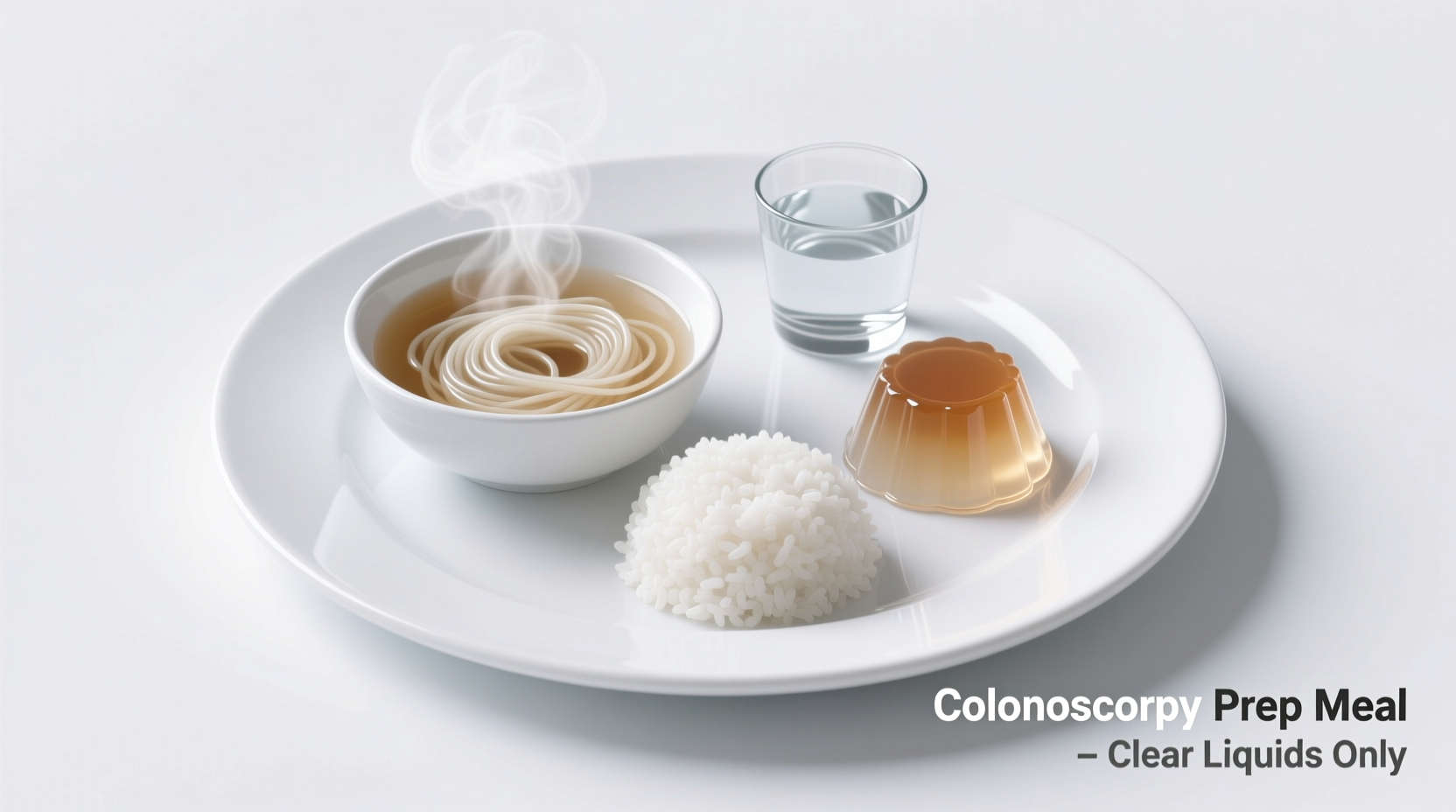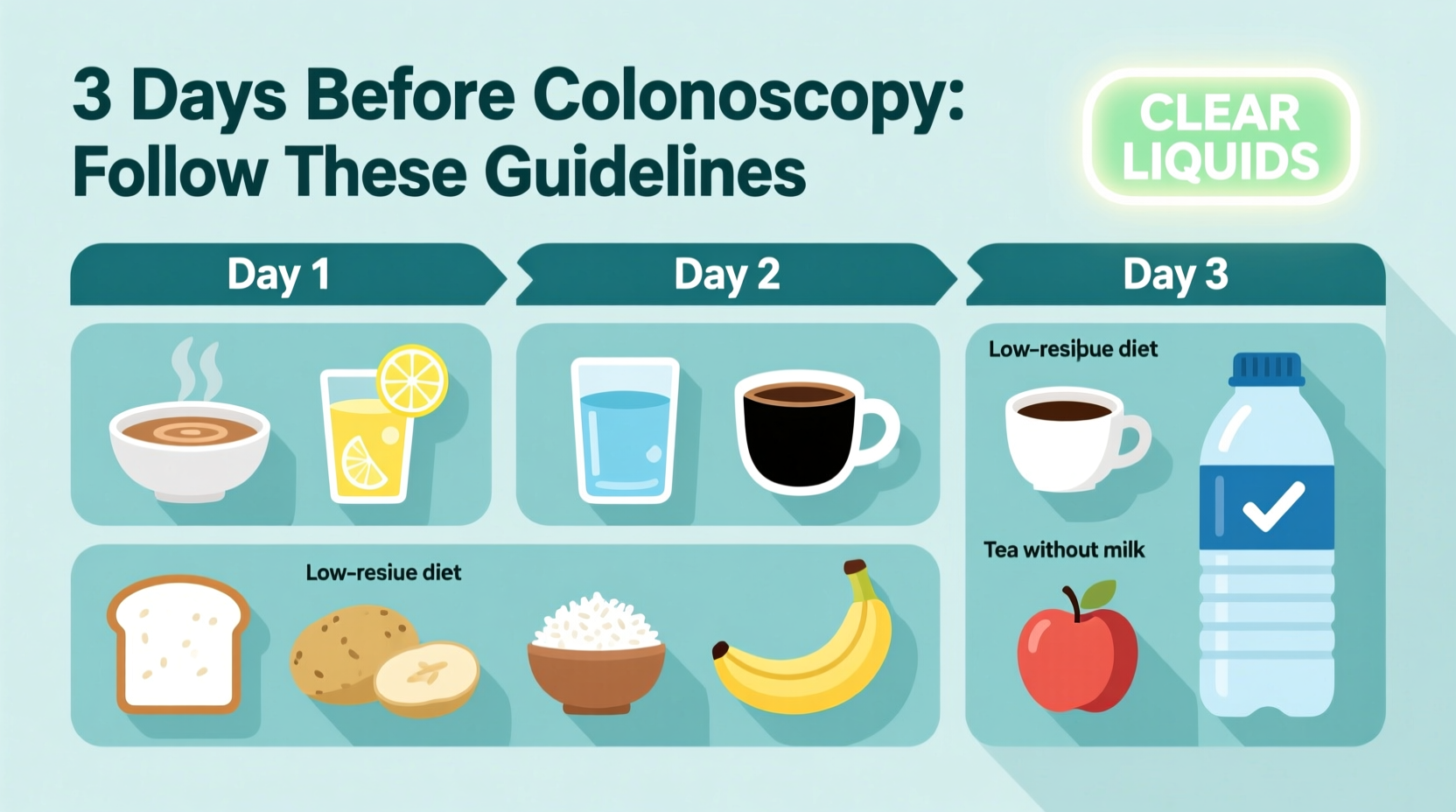Preparing for a colonoscopy requires careful dietary planning to ensure your bowel is completely clean for the procedure. What you eat three days before your colonoscopy significantly impacts the effectiveness of your bowel prep and the success of your examination. This guide provides medically accurate information to help you navigate the crucial three-day preparation period with confidence.
Your Three-Day Colonoscopy Preparation Roadmap
Understanding the timeline for colonoscopy preparation is essential for a successful procedure. Starting your dietary modifications three days in advance gives your digestive system adequate time to clear out, reducing the risk of incomplete bowel cleansing that could compromise your examination.
Day 3: The Low-Fiber Transition
Three days before your colonoscopy marks the beginning of your low-fiber diet phase. This transitional period helps gradually reduce the residue in your colon while still providing necessary nutrition. According to the American Society for Gastrointestinal Endoscopy, proper preparation starting three days in advance significantly improves procedure outcomes.
During this phase, focus on foods that are easily digestible and leave minimal residue in your colon. Your diet should consist primarily of:
- White bread, rolls, and pasta (no whole grains)
- Refined cereals like Rice Krispies or Corn Flakes
- Lean proteins including skinless chicken, turkey, and fish
- Well-cooked vegetables without skins (carrots, green beans)
- Low-fiber fruits like bananas, cantaloupe, and watermelon
- Eggs and tofu
- Clear broths and soups without vegetable chunks
| Foods to Eat (Day 3) | Foods to Avoid (Day 3) |
|---|---|
| White bread and pasta | Whole wheat bread and pasta |
| Rice Krispies cereal | Bran cereals |
| Lean chicken or fish | Red meats |
| Cooked carrots and green beans | Raw vegetables |
| Bananas and melons | Berries and fruits with seeds |
This dietary comparison table highlights the critical distinctions between acceptable and prohibited foods during the three-day preparation phase. Following these guidelines precisely helps prevent incomplete bowel preparation, which occurs in approximately 25% of colonoscopies according to research published in the American Journal of Gastroenterology.

Why Fiber Restriction Matters
Reducing fiber intake three days before your colonoscopy serves a critical medical purpose. Fiber creates bulk in your digestive system and slows transit time, which is precisely what you need to avoid before a colonoscopy. The Mayo Clinic explains that high-fiber foods can leave particles in your colon that obscure the physician's view during the examination.
When your colon isn't properly cleansed, your doctor may miss precancerous polyps or other abnormalities. Incomplete preparation can lead to:
- Reduced polyp detection rates by up to 26%
- Potential need for repeat procedures
- Longer procedure times
- Increased patient discomfort
Day 2: Progressing to Clear Liquids
As you move to the second day before your procedure, your diet will transition further toward clear liquids. This phase typically begins 24-48 hours before your colonoscopy, depending on your doctor's specific instructions. During this period, you'll start your bowel cleansing solution as directed by your healthcare provider.
Acceptable foods and beverages include:
- Water and clear broths
- Clear juices without pulp (apple, white grape)
- Tea or coffee without cream
- Gelatin (avoid red or purple colors)
- Electrolyte replacement drinks
Day 1: Complete Clear Liquid Diet
The day before your colonoscopy requires a strict clear liquid diet. This final preparation phase ensures your colon is as empty as possible for optimal visualization during the procedure. Continue drinking your bowel prep solution as instructed, staying well-hydrated with approved clear liquids.
Common Preparation Mistakes to Avoid
Many patients unknowingly compromise their colonoscopy preparation. Be mindful of these common pitfalls:
- Starting prep too late: Begin your low-fiber diet exactly three days before, not two
- Misjudging portion sizes: Stick to moderate portions to avoid overwhelming your digestive system
- Consuming prohibited beverages: Avoid red, purple, or blue liquids that can discolor your colon lining
- Stopping liquids too early: Continue drinking clear fluids until instructed otherwise by your doctor
- Ignoring medication interactions: Consult your doctor about which medications to continue or暂停 during preparation
Personalizing Your Preparation Plan
Your specific preparation instructions may vary based on individual health factors. Patients with diabetes, kidney disease, or other medical conditions often require modified preparation protocols. Always follow the specific guidance provided by your healthcare provider rather than general recommendations.
The Johns Hopkins Medicine emphasizes that personalized preparation plans significantly improve outcomes for patients with special medical considerations. Discuss any dietary concerns or medical conditions with your gastroenterologist well in advance of your procedure.
What to Expect After Your Procedure
Following your colonoscopy, you'll gradually reintroduce regular foods. Start with light, easily digestible meals and slowly incorporate higher-fiber foods back into your diet over several days. Most patients can resume their normal diet within 24 hours, though your doctor may provide specific recommendations based on your procedure results.
Final Preparation Checklist
- Confirm your exact preparation schedule with your healthcare provider
- Shop for approved foods three days in advance
- Arrange for someone to drive you home after the procedure
- Clear your schedule for the day of preparation and procedure
- Stay hydrated throughout the preparation process
- Have entertainment ready for your preparation days











 浙公网安备
33010002000092号
浙公网安备
33010002000092号 浙B2-20120091-4
浙B2-20120091-4